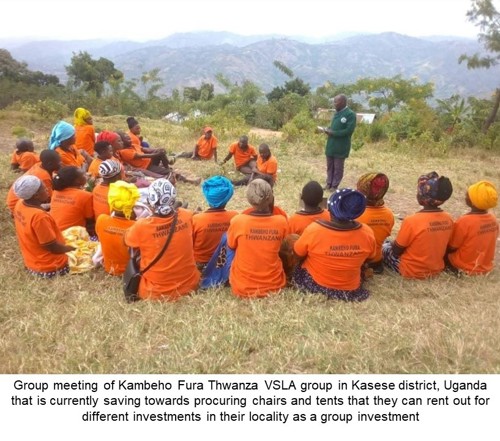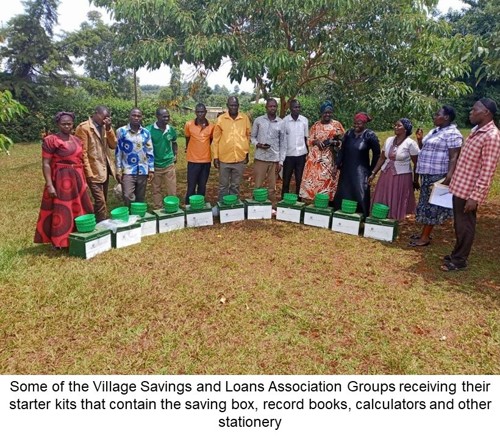02/09/23
Village Savings and Loans Associations for smallholder coffee farmers in Uganda

As demand for specialty coffee increases, there is pressure on the smallholder farmers, the main contributors to the specialty coffee volume, to scale up production on their small farms. Increased production on their farms can only be achieved through increased investment in farm inputs, something that is hard to achieve by these farmers due to the low household income and limited access to finances. Another barrier is that available financial institutions are expensive as they require collateral and have high interest rates.
Many financial innovations have been developed in the farming communities as the farmers need sustainable and affordable solutions to access financing. Currently, the most promising financial solution for smallholder farmers is the Village Savings and Loans Associations groups (VSLA's). These are small community savings groups formed by the farmers with the aim of lending to the different group members in times of need. They are locally organized, self-managed, and secure as all participants are locals from the given area, which has made them popular and an easily acceptable alternative for the farmers. Many farmers testify to the positive impact the VSLA groups have had on them as they can now easily access credit with lower interest rates which they use to buy inputs for their farms, and also invest in other income-generating businesses like retail shops, piggery, poultry, among others.
Mr. Muguni Alex, a member of Mutima Gumu farmer’s VSLA group testified to being able to educate all his children with the help of the finances attained from the group investments made in poultry, and farming of annual crops like maize.
Kawacom has continued to sensitize the smallholder farmers on the VSLA structure, group dynamics, and the benefits of these groups so as to strengthen the group operations. In partnership with Taylors of Harrogate, Private Sector Foundation, and Agricultural Business Initiative, Kawacom has been able to distribute more than 100 VSLA group starter kits to newly created groups in the Sipi region, Kasese, Westnile, and Albertine regions.

Article written by: Rachael Ange
More news
Research
Click to read this articleCMPs significantly decreased deforestation in the most at-risk protected areas in Africa since 2000
This article explores collaborative management partnerships (CMPs) between state wildlife authorities and nonprofit conservation organizations to manage protected areas (PAs) have been used increasingly across Sub-Saharan Africa since the 2000s.
Insights
Click to read this articleThe Cocoa Price - A Key Factor for a Living Income for Farmers
SWISSCO has published a brief regarding perspectives and solutions regarding the price of cocoa and how it is relevant for a living income for farmers.
Insights
Click to read this articleECOM's Green Meter
We are pleased to announce the official rollout of our internal carbon calculator, Green Meter, which has been third-party reviewed by SustainCERT.
Research
Click to read this articleClimate-Smart Agriculture and Agroforestry in Cocoa
This guidance document was published by SWISSCO and focuses on approaches, financing needs and opportunities as well as providing high level guidance for stakeholders in the cocoa sector seeking to establish a broad range of actions that take the complexity of crop- and site-specific impacts of climate change and the realities of smallholder cocoa farmers into account.
Insights
Click to read this articleBeginners guide to Carbon Credits
This report provides an overview of the Voluntary Carbon Market (VCM), from what it is to the roles of carbon standards, governments, and Indigenous Peoples in the VCM.
Research
Click to read this articleGoogle Earth Engine, an innovative technology for forest conservation
This report explores how Google Earth Engine (GEE) can and has been used as a land monitoring tool to help enforce forest protection laws, co-authored by ECOM's SMS Manager Coffee, Thuan Sarzynski.
Research
Click to read this articleIncome study of cocoa producing households in Ghana
The Swiss Platform for Sustainable Cocoa (SWISSCO), in collaboration with the Ghana Cocoa Board (COCOBOD) and other partner institutions such as FiBL and HAFL, conducted a joint study to assess the current income situation of cocoa farming households in Ghana.
Stories
Click to read this articleLiving Income in Latin America: Towards a Prosperous Future
The Living Income Community of Practice hosted the annual in-person workshop and learning journeys in Colombia during the week of the 4th of November.
Research
Click to read this articlePrinciples for Regenerative Landscapes — Circular Bioeconomy Alliance
This report advocates for a transition to a circular bioeconomy supporting biodiversity and human well-being through 10 key principles.